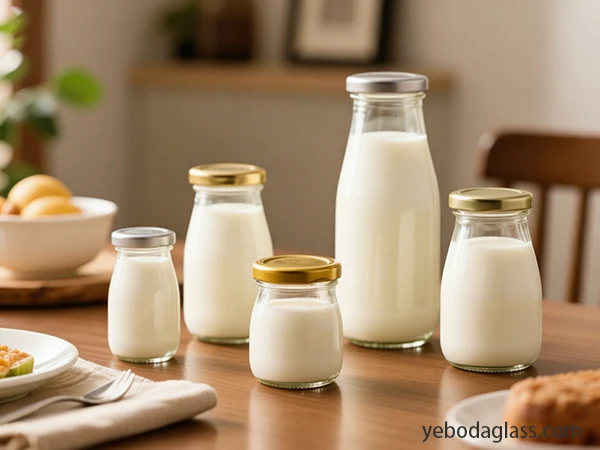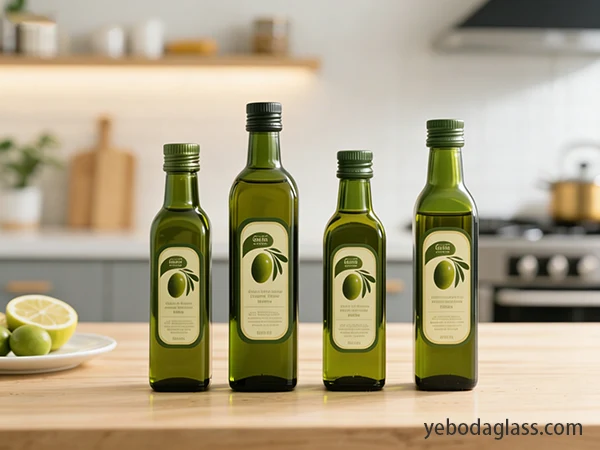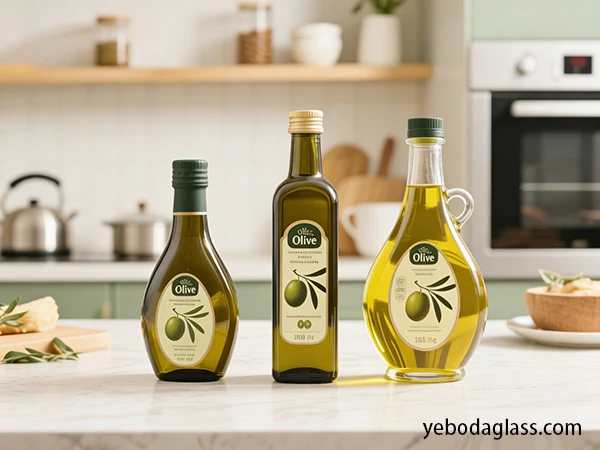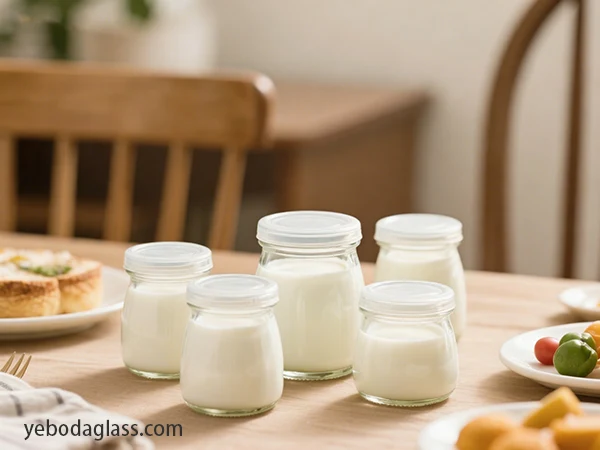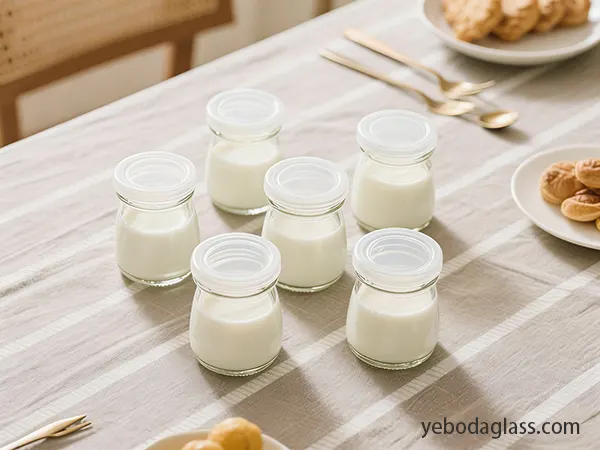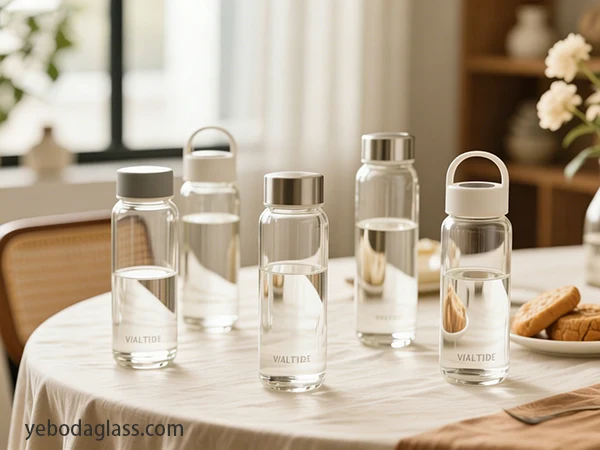Bevezetés
A mini mézesüvegek nagykereskedelmi piaca erős lendületet vett 2025-ben. Ez nagyrészt a megnövekedett fogyasztói keresletnek és a természetes édesítőszerek, a kézműves termékek és a fenntarthatósági tényezők iránti vonzalomnak köszönhető. A nagykereskedelmi piacon nyilvánvalóan megnyilvánuló trendek közé tartozik az e-kereskedelem, mint új piac a különleges élelmiszerek számára, és különösen a mini mézesüvegek esetében. mézesüveg termékek, innovatív csomagolástervezés és az ellátási lánc rugalmassága. Ez a jelentés ezeket a trendeket és azok összesített következményeit előremutató megközelítéssel tárgyalja, és ajánlásokat fogalmaz meg a nagykereskedelmi ügyfelek számára, akik eligazodnak ebben az informatív és folyamatosan változó területen. A jelentésben a Yeboda mini mézesüvegeket egyedi értékesítési ajánlatként használva elemeztük a piaci mozgatóerőket, az innovációkat, az árazást, az ellátási láncot, a fenntarthatóságot, a versenyképességi referenciaértékeket és a végfelhasználói keresletet.
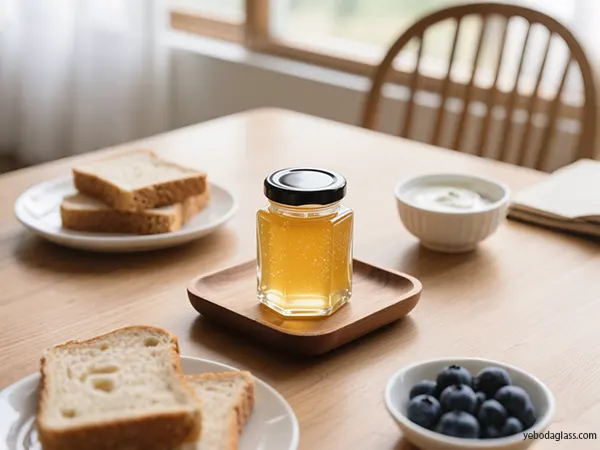
Piaci áttekintés és szegmentáció
A teljes globális mézpiac hasznos mérőszám a mini mézesüvegek iránti kereslet felmérésére.
Globális mézpiac mérete és növekedése
A teljes globális mézpiac értéke 2024-ben 9,2 és 10,02 milliárd USD között volt. A globális piac várhatóan 2025-re eléri a 9,3 milliárd USD-t. 2033 és 2035 között a teljes globális mézpiac várhatóan 13,44 milliárd USD és 17,79 milliárd USD között fog növekedni. A jelenlegi előrejelzések szerint a mézpiac a 2025 és 2033/2035 közötti időszakban körülbelül 4,7% és 5,56% közötti összetett éves növekedési ütemmel (CAGR) fog növekedni. Az amerikai mézpiac várhatóan eléri a 4,79 milliárd USD-t 2033-ra, a 2023-2033 közötti időszakban pedig a CAGR-előrejelzés 4,93%.
Mini mézesüveg piac szegmentálása
A mini mézesüvegek piaca a végfelhasználói iparágak szerint szegmentálható: kézműves élelmiszergyártók, ajándékkosár-gyártók és kozmetikai termékgyártók. A mini mézesüvegek értékelésekor megtudtuk, hogy a fő üvegtípusok üveg- és műanyag üvegek, valamint különféle fedelek. A fogyasztók meglepésének lehetősége kisebb tételű, természetes, vonzó csomagolással minden szegmens számára értéket teremt a mini mézesüvegek piacán.
E-kereskedelem és kiskereskedelmi csomagolás
Az online vásárlás és kiszállítás növekedése még magasabb árkategóriájú kiskereskedelmi csomagokat eredményezett, amelyek nemcsak a fő célnak megfelelő formát és funkciót kínálják, hanem különösen érdekesek a szemet gyönyörködtető csomagolás miatt, amely ellenáll a késedelmes szállítási időknek. Yeboda A legjobb átlátszóságukról ismert mini befőttesüvegek és minden igényt kielégítő kialakításuk révén emelt mini befőttesüvegeink széles körű végfelhasználói igényeket is kielégítenek.
Kulcsfontosságú növekedési tényezők
A 2025-re előrejelzett kiaknázatlan mini mézesüveg nagykereskedelem növekedésének számos mozgatórugója van.
Fogyasztói preferenciák
A „természetes” édesítőszerek iránti megnövekedett fogyasztói kereslet és az egészségtudatosság, mint vásárlási szempont, lendületet adott a mézpiacnak. A bio és nyers méztermék-kategóriák iránti fenntarthatóan növekvő érdeklődés tovább ösztönözte a piac növekedését, és a méz élelmiszerekben és italokban, kozmetikumokban és gyógyszeriparban való egyre több felhasználója folyamatos növekedést eredményez.
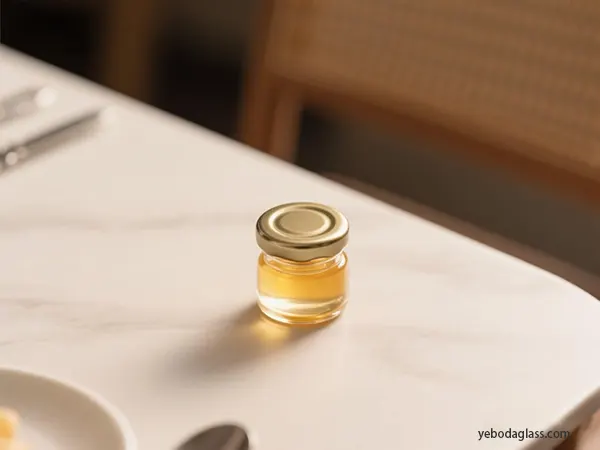
Növekvő eldobható jövedelem
A rendelkezésre álló jövedelmek növekedése, különösen a fejlődő országokban, támogatja a piaci potenciált azáltal, hogy nagyobb fogyasztói kiadásokat ösztönöz a különleges élelmiszerekre.
E-kereskedelem befolyása és csomagolási innováció
Az e-kereskedelmi platformok térnyerése fokozott hozzáférést kínál a mézmárkákhoz, és a fogyasztóknak valami vonzó, mégis tartós termékre van szükségük a méztermékek szállításához. Az iparágakban az egyedi csomagolás felé való folyamatos elmozdulással a mini mézesüvegek prémium, kényelmes opciót jelentenének. A mini mézesüvegek úgy tervezhetők és gyárthatók, hogy modern és prémium élményt nyújtsanak. A Yeboda olyan mini mézesüvegeket kínál, amelyek jól megtervezettek és gyártottak, hogy támogassák a makro-vezérlőket.
Feltörekvő trendek és innovációk
Sok innováció van az új csomagolóanyagok és a csomagolástervezés terén a mini mézesüvegek piacán.
Fenntarthatóság és anyagok
A fenntarthatóság a legnagyobb trend, amely az élelmiszer- és italgyártást sújtja, a szabályozások és a fogyasztók egyre nagyobb hangsúlyt fektetnek a biológiailag lebomló, komposztálható és újrahasznosítható anyagokra.
Minimalista és interaktív dizájn
A különféle csomagolási formákban megjelenő minimalista dizájnt a kortárs dizájnban megfigyelhető márkaépítési/csomagolási trend befolyásolja, amely a modern, friss és autentikus érzést hangsúlyozza, a minimalista dizájnokban gyakran firkákat és maratásokat használva, amelyek alátámasztják a termékek kézzel készítettként való pozicionálásának gondolatát. Az élénk színek, a játékos színek és a texturált vagy interaktív anyagok is egyre népszerűbbek, mivel hangsúlyozzák a vizuális és tapintható élményt.
Intelligens csomagolási technológiák
Az intelligens csomagolási technológiák különféle alkalmazásait, például a QR-kódokat és az NFC-címkéket, a vásárlói élmény, a nyomon követhetőség és a márkatörténet javítására használják. Az intelligens csomagolási megoldások rengeteg termékrészletet biztosíthatnak, megállapíthatják a termék hitelességét, sőt személyre is szabhatják az élményt, ami nagyon fontos a luxuscikkek, például a prémium különleges méz esetében.
Üveggyártási innovációk
Az üveggyártás egyéb fejlesztései, mint például a könnyű súly és a magasabb újrahasznosított üvegtartalom (törmelék), hozzájárulnak a fenntartható csomagolási gyakorlatokhoz. A Yeboda mini mézesüveg esztétikus, praktikus kialakításával és környezetbarát anyagaival élen jár ezen fejlesztések terén, amelyek a mai kifinomult B2B vásárlók számára is vonzóak.
Árazás és költségek
Számos tényező befolyásolja a mini mézesüvegek nagykereskedelmi árazását 2025-ben.
Anyagköltségek és termelés
A műanyag edények gyártása általában olcsóbb, mint a üvegedények általánosságban, különösen a gyártás energiaköltségeit figyelembe véve. A műanyag könnyebb, így alacsonyabb szállítási költségei jelentősen befolyásolják a csomagolás összköltségeit.
Márkaészlelés és az üveg értéke
Az üvegek gyakran magasabb érzékelt értéket és márkaidentitást hordoznak, ami nagyobb megtérülést jelenthet a befektetésre. Továbbá az üveg végtelenül újrahasznosítható, így korlátlanul újrafelhasználható a minőség romlása nélkül.
Fenntarthatósági szempontok
Bár a szűz műanyag gyártása kevesebb energiát igényel, mint az üvegé, a műanyag szénlábnyoma és újrahasznosíthatósága (és a hozzá kapcsolódó műanyagszennyezés) gyakran kevésbé kedvező, mint az üvegé. A mini mézesüvegek esetében a műanyag vagy az üveg kiválasztása a márkastratégiától, a célpiactól és a fenntarthatóság iránti elkötelezettségtől függ. A Yeboda prémium üveg alternatívákat kínál, amelyek magas értéket biztosítanak a minőség vagy a márkaérték feláldozása nélkül.
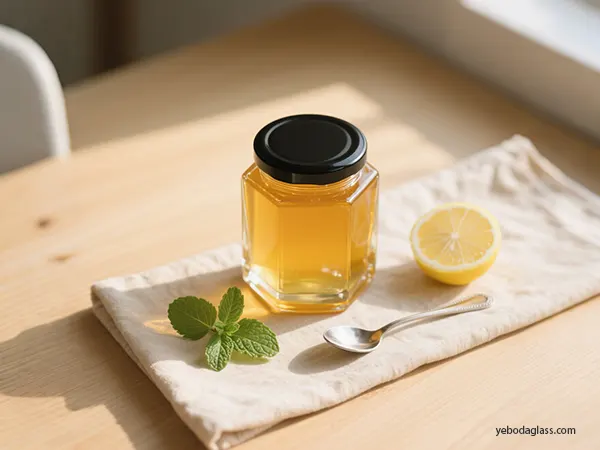
Ellátási lánc dinamikája és stabilitása
Az mini mézesüvegek ellátási lánca országszerte fennakadásokkal néz szembe, különösen az üveg esetében.
Ellátási lánc kihívásai
A több ágazatból érkező megnövekedett kereslet és a nemzetközi áruszállítási késedelmek miatt kikötői torlódások, berendezéshiány és teherszállítási szűk keresztmetszetek alakulnak ki. A magas energiaárak, a homok nyersanyaghiánya és az üvegkohók körforgása súlyosbítja az ellátási lánc összes kihívását.
Rugalmassági stratégiák
A vállalkozások alkalmazkodnak a rugalmasság növelése érdekében, például rugalmas szerződések, szegmentált beszerzés, beszállítói kockázatértékelés és a kereslet előrejelzése révén. A szállítók diverzifikálása és az előzetes megrendelések elengedhetetlenné váltak a termékek elérhetőségének biztosításához. Ugyanilyen fontosak a valós idejű láthatóságot és a beszállítókkal való együttműködést biztosító digitális eszközök.
Fenntarthatósági szabályozások
A fenntarthatóság nem trend, hanem alapvető fogyasztói elvárás 2025-ben, és ez határozza meg a mini mézesüvegek csomagolásával kapcsolatos döntéseket is. Az olyan szabályozások, mint az EU csomagolási és csomagolási hulladékról szóló rendelete (PPWR), 2030-ra újrahasznosítható csomagolást írnak elő, az Egyesült Államokban a kiterjesztett gyártói felelősségre (EPR) vonatkozó szabályozások pedig növelni fogják a költségeket és új csomagolási lehetőségeket ösztönöznek. Az Egyesült Államok Élelmiszerbiztonsági Modernizációs Törvénye (FSMA) szigorúbb szabványokat fog bevezetni a csomagolásra vonatkozóan a szennyeződési kockázatok korlátozása érdekében. A Yeboda elkötelezett amellett, hogy támogassa ezeket a fenntarthatósági intézkedéseket azáltal, hogy újrahasznosítható anyagokból készült mini mézesüvegeket kínál, amelyek megfelelnek a változó szabályozásoknak.
Versenyképes környezet és stratégiai benchmarking
A nagykereskedelmi mini mézesüvegek piacán a beszállítók a nagy hagyományos gyártóktól a speciális niche beszállítókig terjednek.
Beszállítói sokszínűség
Ez a sokszínűség lehetővé teszi a márkák számára, hogy számos beszállító közül válasszanak, akik üveg és műanyag anyagokat kínálnak, méret, forma, szín és fedélkialakítás tekintetében. Az olyan cégek, mint a Crystal Glass Bottle és a Roetell Glass, jelentős beszállítók az üveg mézesüvegek terén, és mélyreható testreszabási lehetőségeket és világméretű szállítást kínálnak.
Összehasonlító értékelési szempontok
A benchmarking során a nagykereskedelmi ügyfeleknek olyan szempontokat kell figyelembe venniük, mint a termékminőség, az anyagfenntarthatóság, a testreszabható opciók, a minimális rendelési mennyiség (MOQ), az ár és az ellátási lánc megbízhatósága.
Kézműves és prémium trendek
A kézműves és prémium termékek felé való elmozdulás trendjével a csomagolástervezés és a történetmesélés egyre fontosabbá vált. Az innovatív dizájnt, fenntartható anyagokat és intelligens csomagolást, például QR-kódokat kínáló beszállítók kiemelkednek a piacon. A Yeboda jó helyzetben van a prémium minőség, az innovatív dizájn és a kézműves élelmiszerek és kozmetikumok piacán szerzett széleskörű tapasztalatának köszönhetően; a Yeboda hozzáadott értékű stratégiai partner a nagykereskedelmi ügyfelek számára, akik márkaértéket szeretnének növelni és piaci részesedést növelni.
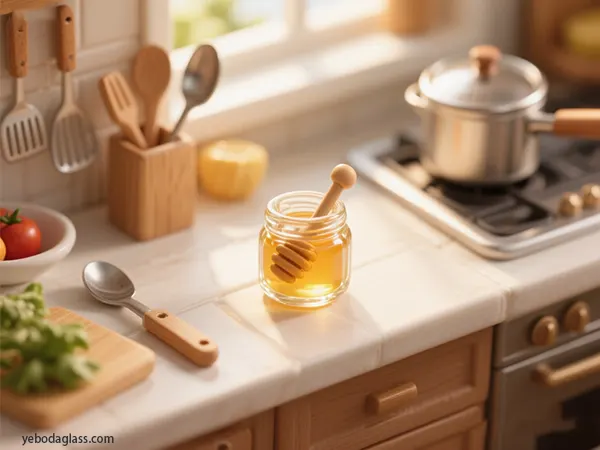
Végfelhasználói keresletelemzés és jövőbeli kilátások
A mini mézesüvegek iránti kereslet a végfelhasználók részéről erős, amit a kézműves termékek, az ajándékozás és a természetes kozmetikai összetevők egyre növekvő népszerűsége inspirál.
Fogyasztói preferenciák
A fogyasztók gyorsan keresik az olyan termékeket, amelyek minőséget és pozitív márkaélményt egyaránt kínálnak a csomagolással együtt. Az ajándékkosarak hangsúlyozzák az esztétikai megjelenést, az érzékelt árat és az újrafelhasználhatóságot, erősen előnyben részesítve a tartós és egyedi lehetőségeket. A mini mézesüvegek jól illenek tematikus ajándékkosarakba, például reggelizőkészletekbe, jóléti csomagokba vagy kézműves élelmiszer-kollekciókba.
Újratölthető és intelligens csomagolás
Az újratölthető és újrafelhasználható csomagolások iránti kereslet fontos trend, különösen a kozmetikumokban. Az intelligens csomagolási technológiák, beleértve a QR-kódokat és az NFC-chipeket, a várt élményt nyújtják, miközben támogatják a nyomon követhetőséget és a fogyasztói elköteleződést.
Összhangban a fogyasztói trendekkel
A természetes termékek, a fenntartható gyakorlatok és az innovatív csomagolási megoldások iránti érdeklődés folyamatosan növekszik. A Yeboda Mini Honey Jar sokoldalú kialakításával, prémium minőségével és a főbb fogyasztói trendekhez való igazodásával készen áll arra, hogy kielégítse ezt az igényt, és a nagykereskedelmi ügyfelek számára egy olyan meggyőző terméket kínáljon, amely növeli a márka értékét és a fogyasztói vonzerőt.

